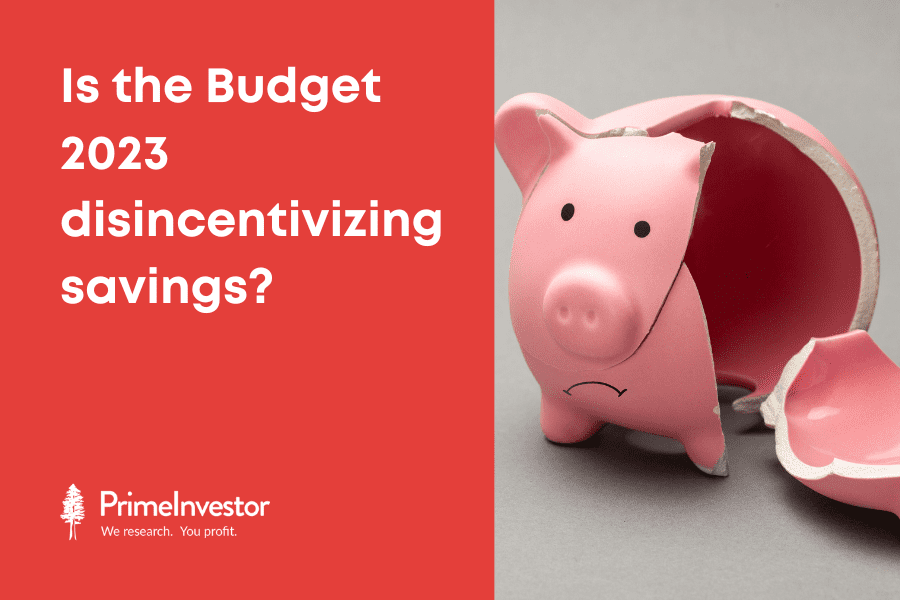The trending narrative post the Budget 2023 proposal is that the Budget is disincentivizing savings. The argument goes like this: if the Budget is nudging individuals to move to the New Tax Regime, it likely means that it may eventually phase out many of the deductions available under the Old Tax Regime. Tax incentive is a major consideration for Indians to save. Hence, without such incentives, we might be encountered with a nation that spends more than save.

We think this argument holds no water. In fact, we think moving towards exemption-less regime or the New Tax Regime would help you break-free from the shackles of product manufacturers who made you believe that no product without tax incentive is a good product. It will help you get out of some of the poor, inefficient and ill-fitting products that were sold only on their strength of having tax breaks!
Taxation on investments based on risk-reward
But before we get into that, let me first put forth the well-considered logical investment tax structure that is there today for taxing financial and physical assets. I think such a well-thought out structure by itself provides enough sops to invest.
- Today, equities, the riskiest and most rewarding asset class is provided a superior tax treatment. In other words it is taxed less at 15% for short term capital gain and 10% for long-term capital gain. This is after a Rs 1 lakh per year of deduction is allowed. This helps investors build wealth optimally and also helps the nation if retail investors participate in the market.
- Listed bond market instruments are given the next preference with LTCG kicking in after just a year and taxed at just 10%. Unlisted bonds require a 3 year holding to be classified as long term and taxed at 20%. Other market-linked debt (like debt MFs) are accorded indexation along with gold and physical property. Not as good as equity but still sensibly indexed to cost inflation and help beat inflation a majority of the time.
- The regular fixed income earning investments like FD are taxed at your slab rate. There needs no incentivisation there as financialization is happening well and will continue to happen. UPI has helped individuals make the leapfrog to having bank accounts. FDs are a next step.
The rate of return in the fixed income market in India is decent compared with many other economies and pockets of opportunities (like now) help lock into favourable rates. Inflation is almost always managed well, and the data below will tell you how inflation has largely been under check, even as the RBI has ensured that FD investors, especially those in the lower income bracket, get some real returns out of their investments.
While the last 2 years of low interest would make you believe depositors got a raw deal, this isn’t entirely true across time frames. You will be surprised to know that if you take the humble bank FD (average of 3 major banks taken by RBI), the pre-tax return has beaten inflation (taking the Cost inflation index) 65% of the times over various 5-year rolling periods in the past 20 years! Yes, this outperformance is 75% if you take 10-year rolling periods. And what happens post tax? Assuming 10% taxation (which is where a majority of senior citizens or individuals fall under), the outperformance over rolling 5-year periods is still 65%.
Once the tax slab goes to 20%, the post-tax outperformance is a little under 50%. And that is where, products such as equity funds, ETFs and stocks help to diversify and beat inflation. And it is a natural choice for those in the higher income bracket.
What am I trying to say with the above points? India has a well-structured largely win-win taxation structure for investment products in general. There is incentive to drive money to capital markets and regulated products, interest rates still allow you to largely beat if not keep up with inflation over longer time frames and there are disincentives as well for products that try to escape taxes, especially for those in the high income group (read about the recent insurance maturity taxation here) or in income akin to gambling. You can’t ask for more IMHO!
Government not your financial planner
Now, India is probably among the few countries that provided the maximum tax incentives to save. Save for whose sake? For your own future! I am not sure it is the Government’s job to do that.
With the present direction of the Budget, it is clear that the government is getting out of your personal finances, and this should be welcome. Whichever government takes over the mantle, it is clear that it is still willing to help the poor and needy – when it comes to food and health care. The number of schemes that the country has for food/cash transfers as well as health insurance schemes at a Central and State level suggest that welfare is not being compromised for those who cannot afford it.
At the same time, that the government will not handhold you into saving is the overall theme whether it is the NPS or the New Tax Regime. The Government will not manage your money or tell you how to manage your money. It is up to the individuals to make prudent choices for their own future and financial security. People who oppose these moves are still clinging on to antiquated notions of welfare state and government playing parents. And this is true of whichever government runs the show. NPS was a bipartisan effort and the New Tax regime, borne out of DTC, was also a bipartisan effort.
How this will help you build wealth efficiently
For many of you reading this article, I have no doubt, a few investment decisions, if not many, would have been based on tax deductions alone. It could have been a poor returning money-back policy or buying a second house merely to get the interest on home loan deduction. For others, it could be that a chunk of your savings goes into good Section 80C products such as PPF, leaving very little for you to deploy well in the capital markets and earn more returns in the long term.
Performance will start mattering more in the absence of tax sops, as manufacturers can no longer take guise under tax deduction in the face of poor returns!
From a financial product manufacturer’s side, many a product were designed to simply help with the tax breaks, not considering whether they were products that were even suitable for you. Many such insurance products exist even today. In mutual funds, many ELSS schemes are a replica of their diversified sister equity schemes (which means they need no additional managing) but with high expense ratio! All of this will change if tax deductions are phased out.
Performance will start mattering more in the absence of tax sops, as manufacturers can no longer take guise under tax deduction in the face of poor returns! You will think twice about investing in more insurance policies and incurring heavy EMIs. Imagine the cash flow that will free up for you without heavy EMIs. If you decide to deploy them (responsibly), you have plenty of options to choose from. Here are a few:
- The freed up EMIs can well be used to deploy in equity market through mutual funds (even simple index funds and ETFs) stocks and if you have large sums (meant for paying property margin) PMS can be an option as well. (Check our recommendations on mutual funds, ETFs and Stocks).
- The freed-up insurance premium from money back policies can be used to have higher term insurance to cover all your liabilities and goals and also used for superior health cover and top ups. (Check our recommendations on Term Insurance and Health insurance)
- While PPF can continue to be a good addition to your portfolio, you can reduce there and diversify into corporate bonds, RBI Floating Rate bonds and G-Secs and the interest used to deploy in SIPs. (Check our recommendations on G-Secs and Privately placed bonds)
With the new regime (Oh I meant the New Tax Regime 😊) we are likely to usher more responsible financial product manufacturers and sellers and hopefully much more responsible investors. The government is simply telling you to take charge of your money and telling manufacturers to earn their money right!
Needless to say, at PrimeInvestor, we are future ready! 😊 We have the right set of well-researched investment recommendations of low cost and optimally returning products, given to you with no bias – no commission, ads, or kickbacks. If you are new to PrimeInvestor, register for a free trial to experience the benefits.







9 thoughts on “Is the Budget 2023 disincentivizing savings?”
Totally agree with the Union Budget proposal to delink Investments with Tax benefits which your article has explained very well. We need to look at this change alongwith increased limits under the SCS and other PO Savings schemes, which are promoting savings to take care of Post Retirement requirements. Hence the Union Budget proposals cannot be construed as disincentivizing Savings.
Leaving out HRA exemption/80c (PF) in the new regime is questionable. The super-rich and the lower middle class have got some relief. The middle “middle” class are being squeezed dry :). Looks like EEE exemptions are on the way out, With the new regime (Oh I meant the New Tax Regime 😊)
So I wished to know what will happen to the category of ELSS? Will that category be removed? Rules will be changed?
Nothing has happened thus far 🙂 It continues under old tax regime. This article is to explain why new tax regime is not bad thing at all if we are forced to move to it in future. Vidya
Good Article; but partially my opinion is different than yours.
we do not have social security number; like in some of other developed countries.
Hence we need to encourage people / citizens to take life/personal ; health ; medical and accident insurance. This will help family after the main earning member departs. By taxing it; they are removing tax exemptions.
Hi Madam,
“Government not your financial planner”.
Good article written in timely manner. Fortunately, have never invested in any such insurance products (or)ELSS funds for the name of tax saving.
For Debt portion , am investing in debt funds, EPF and SSY. Do you have any suggestions here?
Thanks,
Vijay
Good products in debt. Go with it tax saving or not. SSY – if it is for your child, consider adding some gilt funds or corporate bond funds as well.
Thanks Vidya, for your detailed analysis on why government incentives are leading to the sale of poorly performing products. However, the primary argument mentioned is whether a lack of incentives is getting the new generation out of the savings habit. With the tax incentives, the real return was decent enough, and many were willing to invest in it. I am wondering whether having large amounts of cash on hand necessarily means it goes toward prudent savings and better asset allocation. I recently met someone whose company only deducts the statutory minimum of Rs. 8500 per month for PF, and the rest of his investments are in high-risk securities.
During 2008, I met a person in the US who came back from retirement for the same job she used to do As she said, it was not possible for her to see much of her 401K evaporate with the economic meltdown in 2008. I was feeling that India was in better shape because of the government incentives for small savings, which prevented people from running only behind high risk, high gain investments. What is your thought? Anyhow thanks for a good commentary on this topic.
Thank you for your thoughts. Appreciate it. I think we have enough products outside the tax deduction ambit even today such as small savings, G-Secs and treasury bills which are absolutely safe and deliver well. The West does not have such well thought out schemes. Next, I do believe even in the New Regime, at some point when old is phased out healthcare and retirement (like NPS) will receive some priority. thanks, Vidya
Comments are closed.